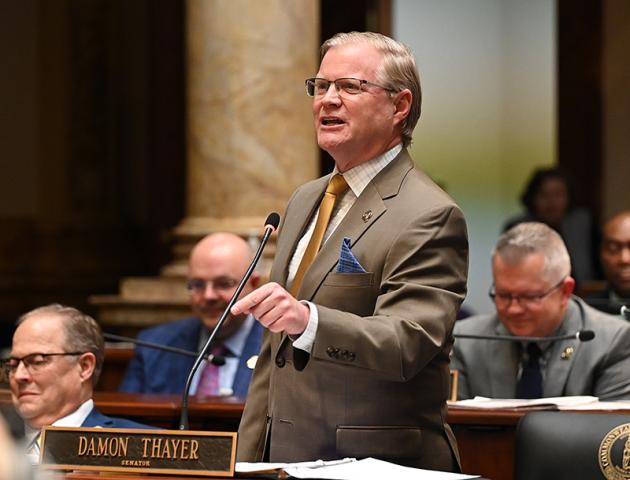Income tax legislation gains Senate approval
“I never thought I would be here listening to people argue about lowering taxes. Maybe I just hang around working people, but for all of my life, they’ve argued, ‘stop taking my money, stop raising my taxes, stop wasting my money. ---Sen. Michael J. Nemes, R-Shepherdsville
-----
FRANKFORT — The Senate on Wednesday approved legislation to reduce the state’s income tax rate after supporters and opponents shared impassioned speeches on the chamber floor.
House Bill 1 calls for income taxes to be reduced from 4.5% to 4 % at the start of 2024. It’s part of a broader, ongoing effort to gradually eliminate income taxes while also expanding the overall tax base.
The bill’s primary sponsor, Rep. Brandon Reed, R-Hodgenville, was present in the chamber after the legislation passed with a 30-5 vote. But Sen. Christian McDaniel, R-Ryland Heights, presented the bill on the floor.
“When we did this, we really wanted to make certain that the approach we took was thoughtful and logical, provided opportunities for checks on the actions that would occur, and then also that we would be very realistic about the financial demands of the commonwealth as well as the importance of letting people keep more of their hard-earned money,” he said.
Last year, the General Assembly passed legislation that set the stage for a revamp of state taxes over several years.
That measure established “triggers” that will lower the state income tax rate by either a half or full percentage point once state revenues reach certain levels. Revenues met the first trigger in 2022, which reduced the state income tax from 5% to 4.5% on Jan. 1.
McDaniel said there are checks in place to ensure the tax reduction does not negatively impact the state financially.
One requirement is that the budget reserve trust fund must total more than 10% of the receipts for the following year. Another is the amount of the income tax reduction can’t be more than half of the amount of the state’s anticipated budgetary surplus.
During debate on the Senate floor, supporters argued that the changes will allow Kentuckians to keep more of their income and create a stronger environment for attracting jobs and growing the economy.
“I never thought I would be here listening to people argue about lowering taxes,” said one supporter, Sen. Michael J. Nemes, R-Shepherdsville. “Maybe I just hang around working people, but for all of my life, they’ve argued, ‘stop taking my money, stop raising my taxes, stop wasting my money.’”
Opponents, however, said the overhaul will harm state coffers and transfer more of the state’s tax liability to people in lower income brackets.
Senate Minority Caucus Chair Reginald Thomas, D-Lexington, said Kentucky’s citizens have many needs that are going to be unmet, including childhood poverty.
“Why we want to engage in this reverse Robin Hood mentality confounds me,” he said. “We want to take from the poor and give to the rich. It makes no sense at all.”
Senate Minority Whip David Yates, D-Louisville, said the tax cut is actually just a restructuring and that many Kentuckians will pay more money out of pocket at the end of the year.
“I keep hearing tax cuts, tax cuts. When I first came into the session we talked about the tax cuts,” he said. “I think since then my constituents, the working families, have realized that it hasn’t been a tax cut. It’s a tax restructuring.”
Sen. Robin L. Webb, D-Grayson, said tax policy is a serious matter, and she voted against the measure, arguing that it will benefit people with higher incomes.
“As we’ve shifted in the past to more consumables taxes, that hurts low-income people,” she said.
But Senate Majority Floor Leader Damon Thayer, R-Georgetown, disagreed, saying that the bill’s detractors were relying on old, worn out arguments.
“With this tax cut, another $650 million a year will stay in the checkbooks and the savings accounts of the people of the Commonwealth of Kentucky,” he said.
The bill now heads to the governor.



























